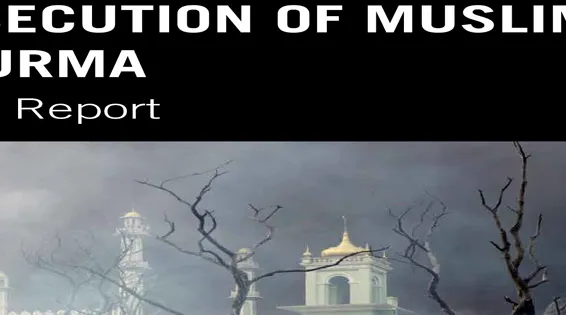BHRN Report: Persecution of Muslims in Burma
05 September 2017

Five years after violence broke out between extremist Buddhists and Muslims in western Burma, displacing tens of thousands of Muslims and precipitating waves of attacks in central Burma, conditions for Muslims (including those who are not Rohingya) throughout the country have worsened. More than 120,000 members of the Rohingya Muslim minority group in Rakhine State remain in displacement camps, while those outside are subjected to increasingly severe restrictions on their ability to travel and to access education and healthcare.
But the post-violence political landscape in Burma has also given rise to more subtle forms of persecution that have not made international headlines, and which have received backing from the government, elements of the monkhood and ultra-nationalist civilian groups. While the outright violence has decreased in frequency, persecution has continued in an institutionalised manner. Across the country, “Muslim-free zones” have been formed, while Muslim places of worship have been shuttered or rendered unusable. Muslims in general continue to be denied ID cards, and the Rohingya in particular have been subjected to campaigns of violence carried out by the military.
This report draws on more than 350 interviews conducted by the Burma Human Rights Network (BHRN) over a eight-month period. Testimony was collected from individuals in more than 46 towns and villages across the country, from Karen State in the east to Rakhine State in the west, and throughout central Burma. The findings fall into six main categories that together provide compelling evidence of the ongoing systematic persecution of Muslims well into the era of pseudo-civilian rule. The report highlights that the persecution is not restricted to the treatment of Rohingya Muslims.
BHRN has documented multiple instances in which Muslims of all ethnicities have been refused ID cards, also known as National Registration Cards (NRCs). The ways in which this manifests varies, but commonly reported problems include the flat-out denial of an NRC card to Muslims; the requirement that Muslims provide extensive, and often difficult to obtain, documentation that proves a family lineage dating back to before 1824; and the refusal by immigration authorities to register a Muslim person as solely Bamar, the majority ethnicity in Burma. BHRN believes that the denial of an NRC in Burma carries both material and ideological implications. Someone who fails to show an NRC when requested by police or another authority is likely to face harassment, and a penalty of a fine, or imprisonment, or both.
Authorities have also persistently blocked the rebuilding of mosques and madrasas that have been either damaged, destroyed or sealed in recent years. Denying a religious group access to a place of worship contravenes a fundamental right to freedom of expression and religion. In Burma, the refusal by authorities to allow the rebuilding of destroyed mosques and the bar on Muslims returning to their places of worship appears to be part of a calculated strategy to deny religious expression for Muslims.
Download full report HERE.
Announcements
21 May 2025
Open letter: Malaysia must lead ASEAN with principle, not hypocrisy, to address the Myanmar crisis

Progressive Voice is a participatory rights-based policy research and advocacy organization rooted in civil society, that maintains strong networks and relationships with grassroots organizations and community-based organizations throughout Myanmar. It acts as a bridge to the international community and international policymakers by amplifying voices from the ground, and advocating for a rights-based policy narrative.